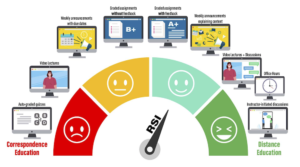
OSCQR – Standard #39
Expectations for all course interactions (instructor to student, student to student, student to instructor) are clearly stated and modeled in all course interaction/communication channels.
Review These Explanations
Expectations for assignments, class participation, proctoring, due dates, group work, collaboration, and attendance requirements should be clearly articulated and easy to find and understand. Adult learners expect and benefit from understanding the parameters and rationale of the learning activities in a course up front.
Outlining clear expectations for timing and frequency of interactions, activities, and assignments, as well as what type of standards should be upheld when working on particular activities, helps learners to be successful and reduces frustration caused by ambiguity. For blended courses, provide clear guidelines for synchronous (in-class) and asynchronous (online) participation.
Regular and Substantive Interaction (RSI)
How This Standard Supports RSI
 This standard is the spirit of RSI. In well-designed online courses, expectations and strategies for regular and substantive instructor-student interactions are clearly stated and modeled in all course interaction/communication channels. The course information, overview, and syllabus materials set the expectations for the course interactions and communications, and make explicit who, what, how, when, where, and how often course interactions will take place. These expectations will provide details on how the online class community will function as a group and individually. Learner questions are anticipated by the instructor and addressed in Course Expectations documentation, discussion forums designed for these purposes, asynchronous activities (or synchronous options) for additional help and questions, and to create and support a common understanding across all course participants. Specific Instructor Communication Plans can be included in Course Expectations, or Course Information/Syllabus materials:
This standard is the spirit of RSI. In well-designed online courses, expectations and strategies for regular and substantive instructor-student interactions are clearly stated and modeled in all course interaction/communication channels. The course information, overview, and syllabus materials set the expectations for the course interactions and communications, and make explicit who, what, how, when, where, and how often course interactions will take place. These expectations will provide details on how the online class community will function as a group and individually. Learner questions are anticipated by the instructor and addressed in Course Expectations documentation, discussion forums designed for these purposes, asynchronous activities (or synchronous options) for additional help and questions, and to create and support a common understanding across all course participants. Specific Instructor Communication Plans can be included in Course Expectations, or Course Information/Syllabus materials:
As your instructor, I plan to interact and engage with each of you on a regular basis throughout the course to support your learning by providing direct instruction via online lectures or overviews of various topics, responding to your questions, grading or providing feedback on your submitted coursework, posting weekly announcements, and engaging in the course discussion areas regarding academic course content whenever appropriate.
Refresh Your Course with These Ideas
General Suggestions
- Clearly outline the expectations for course interactions, collaborations, assignments, activities, and discussion participation, for example, the timing and number of contributions.
- Provide information on timing and frequency of contributions, models/examples are provided, roles are explained, expectations for community standards are explained.
- Provide detailed information on how learner participation will be assessed, evaluated/graded.
- Include instructions about any specific expectations if any, e.g., spelling and grammar expectations.
- Specify and give examples of how learners should title their discussion posts. Discussion post subject lines give learners an opportunity to practice summarizing and clear communication, skills that are important in the professional world. It also helps other learners find their posts more easily because the content is summarized in the subject line.
- Things to consider in revising your syllabus for an online course.
- Instructor sets course expectations and tone, and provides models for the student, e.g., preferred pronouns/names and prefixes of address, formality of writing, expectations in writing communications, formality and informality in interactions, and tolerances and expectations.
- Reference netiquette info and model respect in discussions.
Rubrics
- Creating and Using Rubrics for Assessment.
- Rubrics
- Using Rubrics
- Authentic Activities, Assessments & Rubrics – ppt.
- Resource Rubric
Examples
- Example Course Information/Syllabus statement: “As your instructor, I plan to interact and engage with each of you on a regular basis throughout the course to support your learning by providing direct instruction via online lectures or overviews of various topics, responding to your questions, grading or providing feedback on your submitted coursework, posting weekly announcements, and engaging in the course discussion areas regarding academic course content whenever appropriate.”
- Example Course Information/Syllabus materials.
- Example Course Expectations.
Explore More Refreshing Ideas from the Teaching Online Pedagogical Repository (TOPR) at the University of Central Florida (UCF)
This Pedagogical Practice from TOPR explores methods and approaches to establishing clear expectations in online discussions to benefit learner success.
Explore Related Resources
Share What You Know
OSCQR has been developed by a community of online practitioners interested in quality course design. There are numerous opportunities for community members to offer suggestions, donate resources, and help with future development.
Discuss this standard in the comments section at the bottom of this page.
Contribute your own ideas or refresh resources by filling out the OSCQR Examples Contribution Form.